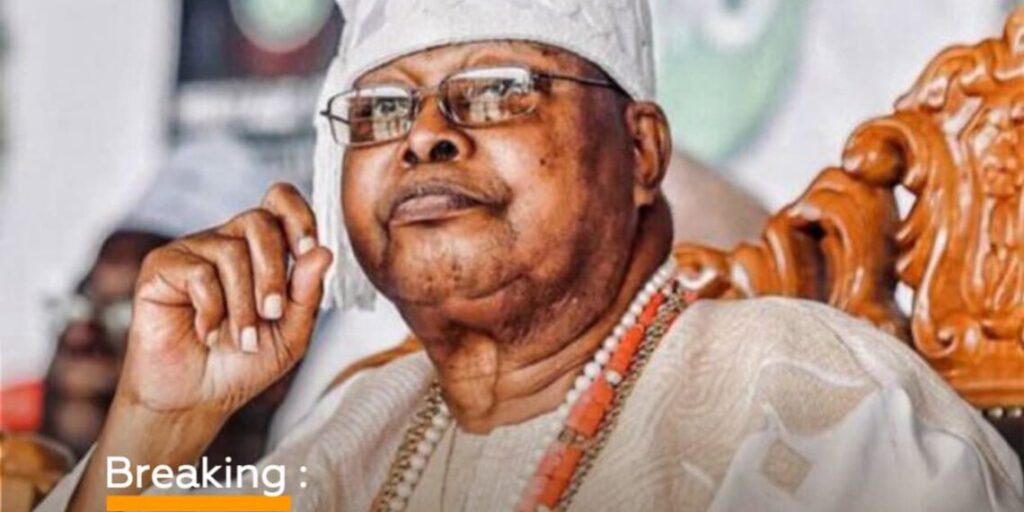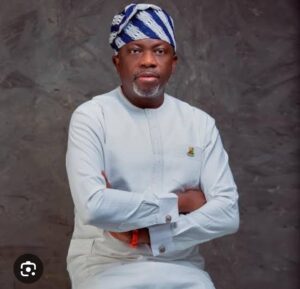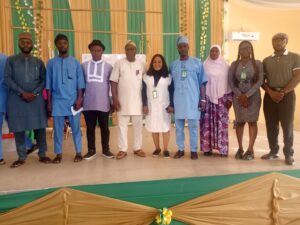
By Sayo Alagbe
Beyind the historical relevance of his tenure as one of the longest serving traditional rulers in Yorubaland, his demise and internment gave him new history in death: his influence has stirred national discourse — not for the grandeur of his achievements alone, but for the unprecedented controversy that followed his burial. Yorubaland has never had it in this manner before. No one knows what lies ahead though. After all, history has a way of repeating itself.
The atmosphere in Ijebuland, has no doubt remained heavy with grief, reflection, and debate, following the recent passing of its paramount ruler, Oba (Dr.) Sikiru Adetona,CFR, at 91. He was a traditional king whose life was defined by grace, principled leadership, and profound commitment to the heritage and future of his people.
Historically, Oba Adetona ascended the throne of Ijebuland at the young age of 26, having been chosen not by political manipulation, or power tussle, but by the revered Ifá Oracle — the spiritual compass of Yoruba traditional culture. His emergence as Oba was widely accepted by the people, who believed in the divine selection through Yoruba ancestral guidance. It marked a turning point in the Ijebuland history, which symbolizes harmonious blend of youth, vigour, culture, tradition, and vision.
Significantly, for several decades, he ruled with the kind of integrity and courage that are already scarce in modern Yoruba leadership. Oba Adetona was resolute, principled, and driven by a strong sense of purpose. His belief in fairness, education, cultural revival, and community development, made him not just a ruler, but a father figure and unifying force for Ijebuland.
Under his leadership, Ijebuland witnessed a cultural renaissance and etched his name and period in history as exceptional monai. Remarkably, Oba Adetona revived the Ojude Oba annual cultural festival — a vibrant celebration that united sons and daughters of Ijebuland, home and abroad. It is a cultural festival that launched Ijebu Ode on UNESCO global map of cultural festivals in the world. Besides, the festival has become a spectacle of culture, tradition, and progress. It rekindled the spirit of camaraderie, showcased the richness of Yoruba heritage, and strengthened the bond between the people and their roots. He deserves the recognition and credits.
Moving forward, the monarch was also a strong proponent of education. He oversaw the construction of modern school facilities and available infrastructures, with the believe that “education is the light of the poor and the weapon of the weak.” His advocacy led to an increase in school enrolment and literacy levels, especially among girls and vulnerable children. He also championed healthcare outreach, youth empowerment, and infrastructural improvement.
Moreover, while many traditional rulers remained silent in the face of governmental failures, Oba Adetona was not one to stay quiet. He fearlessly challenged policies and injustices meted out to his people by successive governments. He was their voice in moments of deprivation and marginalization. His words carried the weight of ancestral wisdom, and his actions displayed the courage of a lion-hearted patriot.
In his courage, he never hesitated to confront leaders, “who make governance a business venture while the governed wallow in penury.” He was beloved for his forthrightness — a traditional monarch with a modern conscience. Despite his failing health in the last few months, Oba Adetona remained mentally alert, and spiritually grounded. His close associates said he had begun to express discomfort with certain traditional rites associated with Yoruba kingship, especially those surrounding the burial of deceased monarchs.
Before his death, he openly criticized some “archaic burial customs”, which, according to him, had outlived their relevance in a fast-evolving society. He reportedly requested a non-traditional burial, preferring what he described as a “dignified and religious” send-off, in line with his personal convictions and religious affiliation, but at the detriment of culture and traditions, whose vehicle he rode to the throne. This declaration, like a script to be acted, would later become the epicenter of a fierce and conflict traditional values and Islamic religion; which has shaken the peace of Ijebuland, and reverberated across Yorubaland. This is not admired.
Further, upon the monarch’s death, a fierce battle broke out between traditionalists and the Muslim community. The latter claimed Oba Adetona as a devout muslim monarch, whose wish was to be buried in Islamic way. Thus, swiftly and without the traditional rites associated with Yoruba kingship, committed to mother-earth. The traditionalists, however, opposed this, argued and arguing that the throne of Ijebuland, and all other Yoruba thrones, are cultural institutions bound by age-old customs.
In a dramatic and emotionally charged atmosphere of many episodes, the corpse of Oba Adetona was hijacked by the muslim faithfuls and buried according to Islamic rites. Thus, by-passed traditional rites of passage. Retrospectively, Oba Adetona’s ascendance to the throne entailed full observance of Obaship rituals. Where were Muslims faithfuls during his ascendance? The act not only shocked traditional authorities, but ignited widespread anger, division, and mourning, marred by resentment.
The town, like a city at war against itself, is now deeply divided, with traditional worshippers accusing religious groups of desecrating the sanctity of Yoruba heritage; while Muslims defend the act as the fulfilment of the monarch’s final wish. This is odd and belittling of Yorubaland, where individual or personal wish over-rides customs, traditions and culture. It is simply cultural scam, stolen tradition. Among the Yoruba elders, the incident marked an alarming precedent that if left unchecked, could erode the essence of Yoruba monarchy and reduce traditional thrones to “mere caricatures” in the words of a local high chief.
Beyond doubt, the death and burial of Oba Adetona have now sparked broader concerns across Yorubaland. Critically, Yoruba cultural custodians, monarchs, and scholars are asking critical questions: can a king, a custodian of tradition, choose to be buried outside tradition? Can a cultural throne accommodate religious exceptions without sacrificing its core values?, among others.
Many fear that if this pattern continues, the symbolic and spiritual power of Yorubaland kingship could be watered down, to render the once-revered institution vulnerable to mockery, irrelevance, and eventual extinction. Traditional norms and values are not usually lost overnight. We lose them in pieces, bit-by-bit. Some argue that to allow non-traditional burials may embolden future kings to neglect cultural responsibilities, especially those rooted in Yoruba cosmology.
Consequently, this moment demands clarity. If a prince aspiring to the throne does not believe in the traditional process of installation and burial, then such an individual should, in the interest of cultural preservation, refrain from contesting for a traditional throne.
The Yoruba monarchy is not just about wearing beads and sitting on luxurious throne; it is a sacred covenant, a spiritual office that must be respected in life and in death. To ascend the throne is to inherit not only the power and privileges, but also the obligations to the gods, ancestors, and customs. It is high time to officialise this context with writing agreements and appended signatures. Yorubaland is beyond Ijebuland. The Yorubas are more than a title, we are collectively intertwined. What happened in Ijebuland, happened to entire Yoruba race, home and abroad.
Notably, Oba Kayode Adetona’s reign was one of excellence, patriotism, and cultural renewal. Though his internment soiled the culture he renewed, he will be remembered for his open-mindedness, his vibrant leadership, and his devotion to his people. However, his death and the surrounding controversy have left his legacy hanged, and perforated his period, life and time. The situation in Ijebuland should serve as a wake-up call to Yoruba people all over the world. It is not just about one king, one town, or one burial. It is about preserving the spiritual and cultural identity of an entire Yorubaland. As Yoruba elders often say, “Oba kii sun, a fi wà lóòrun” (A king does not die, he only transitions to the other realm). Let it be that when a king dies, he does so in honour of the throne he represents.
Let all aspiring monarchs be warned: the crown is not a child’s play, and the throne not a stage for personal convenience, acquisition of wealth and frivolities. If you cannot uphold the tradition in life and in death, do not seek the throne. Let the sacred institution of traditional Yoruba Obaship remain the sole preserve of those who revere its customs, and who are willing to carry its weight with honour, from installation to internment. It is not negotiable!







